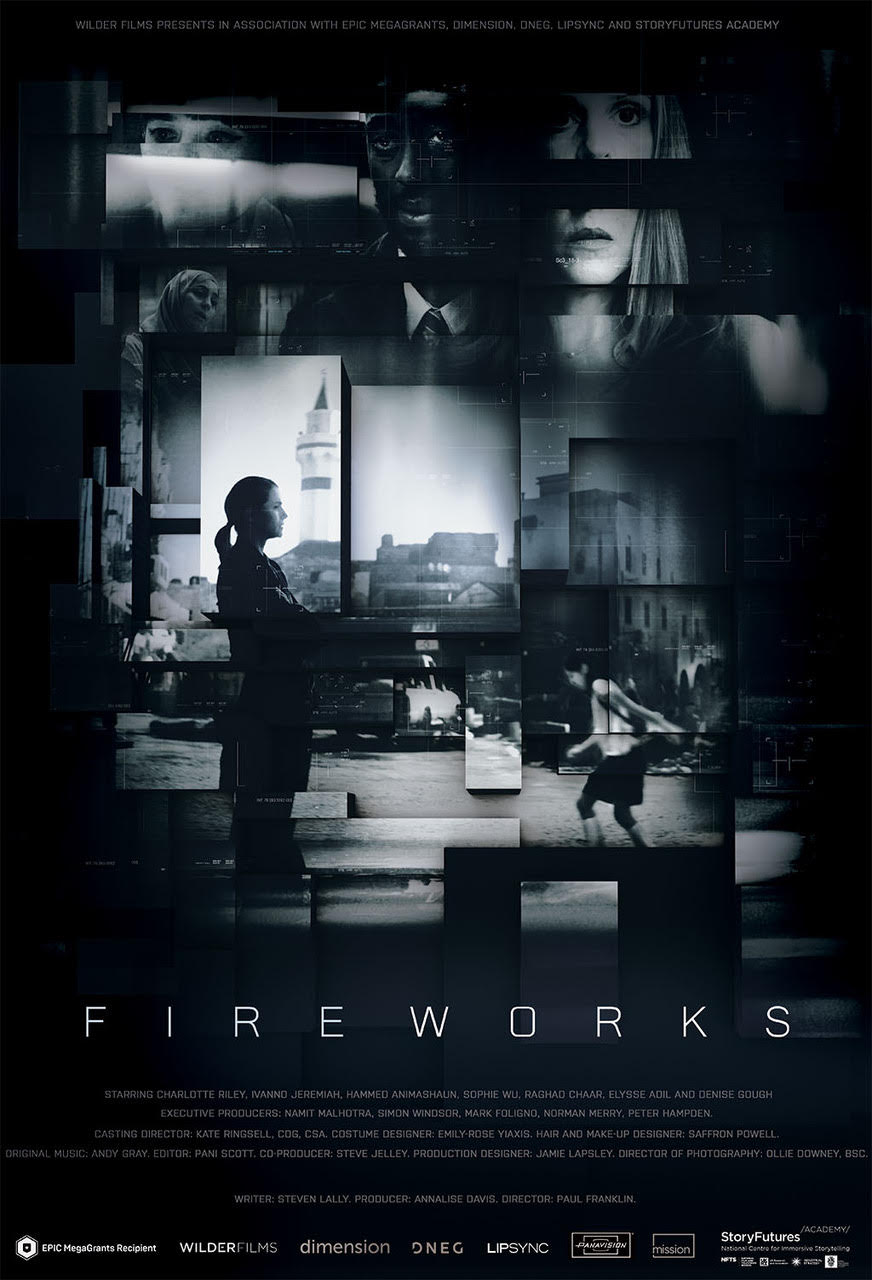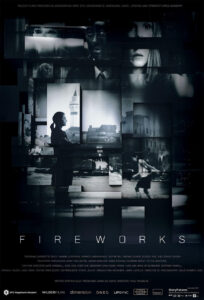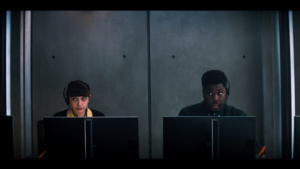
BAFTA Qualifying Short Film Review “Fireworks”
WATCH THE TRAILER HERE
First, the Recap:
The unyielding dominance of having the perfect vantage point. As one might surmise, to be able to base any decision with confidence and certainty when founded on an unwavering sense of having weighed all options then coming to a final conclusion thanks to clearly seeing everything that’s in play and how it will affect the outcome–it’s the ideal scenario. How many times, however, do events ever quite work out this smoothly? It’s the Spec Ops Team 5 room at MI6 that finds a bedraggled group of operators–one unnamed (Sophie Wu), “B” (Hammed Animashaun), and Pep (Ivanno Jeremiah)–along with their bosses Gillian (Charlotte Riley) and Ellie (Denise Gough) facing one decision that deeply impacts the mission they’ve been working on completing–with a cost that will call into question the mindset of compassion, morals, and the cold, calculating truth of duty.
Next, my Mind:
Tangibly and credibly intense without being overdramatic, this 15-minute BAFTA-qualifying short film from director Paul J. Franklin, writer Steven Lally, producer Annalise Davis, co-producer Steven Jelley, and executive producers Namit Malhotra (DNEG), Mark Foligno (Lipsync), Norman Merry (Lipsync), and Peter Hampden (Lipsync) delivers an undeniable, multi-faceted punch that showcases the collision of maintaining national security vs. overt crisis of conscious as it plays out on both personal and grander stages. While on the surface of things it may not be what many would deem a fully “original” story being depicted here (which, honestly folks, is in itself VERY difficult, though not impossible, to achieve if one views a LOT of cinema), it’s as always for this critic what lies beneath the foundations that so often makes these efforts worthwhile to take in, as they prompt us to consider the messages being conveyed, impacting our own minds, and causing us to reassess how we view situations and, perhaps, even the world.
Now, that may come across as overly “deep” to some degree, but make no mistake, the narrative we’re given to absorb that sees an internal group of MI6 operatives and leaders having to make snap choices on the fly, under considerable duress, while having to also navigate a clashing of individual senses of responsibility, due respect, push to question actions being explored or taken, obligation to their careers and country, and needing to be totally informed about all the facts the circumstances demand is unleashed with both blatant and muted ferocity, further shaped by the images we’re seeing that so deftly and convincingly add a shifting perspective to the harsh reality that’s ultimately being made manifest. What might come as a surprise to some who may not quite be as familiar with British cinema overall is that there still manages to be brief instances of humor in the midst of the building chaos, and it strangely DOESN’T feel out of place to have these moments infused into the events. Watch the film to understand better.
But, again, what stands out are the myriad of thematic tangents that I feel hold such potency here because again, beyond the exterior, it’s a study in our humanity and all the elements that make up the concept of what we find ourselves involved and interacting with that are “done in the name of….” and how the potential or realized consequences of our decisions can then linger and weigh down on us in an equally varying number of ways. Blind obedience, power grabs, situational bribery, veiled agendas and as-of-yet-revealed motivations, emotional manipulation, questioning of leadership, the power of one’s convictions or lack thereof in the heat of confrontation, sacrifice of the few to save the many, facing our own misdeeds and errors in judgement that come back to haunt us, and the high price innocence pays due to it all gets addressed with effective and jarring feasibility and hits you with the knowledge that this precise kind of general state of affairs most likely HAPPENS in real life, and THAT is what I believe creates the well-executed atmosphere of edginess, especially as the film reaches one taut and striking finale!
As hinted at earlier, the visuals we witness offer a beautifully rendered change in viewpoint while the proceedings in the room at MI6 are unfolding, periodically transporting us via VR to exactly where the mission in question is taking place, bringing to more vivid life the actuality of the process transpiring and putting a definitively human touch to what is otherwise just a digital “existence” watched from afar, connecting more profoundly as opposed to being subjectively detached, both ideas of which are duly challenged in the film. From the very start, Riley commands the screen with a fiery energy and smoldering earnestness through her role as Gillian, one of the head agents over MI6’s Spec Ops Team 5 who exudes the kind of seemingly unsympathetic, stony, and no-nonsense demeanor one might expect from someone in the position to make the kind of choices she must, to the point of exasperating the operatives she’s over as they show up for the conclusion of an imperative mission they’ve been conducting.
But, as things suddenly take a turn she didn’t expect and initially refused to listen to, the war in her own mind over it soon boils over, forcing her to make a final move that will resonate inside her, for better or worse. It’s such a volatile character, and Riley expertly guides and embodies this with both impassioned and understated excellence. Gough likewise impresses once she appears and more than makes her presence known with a vengeance through her role as Ellie, Gillian’s boss who puts an extreme amount of pressure on her underling to “do what is necessary” even when the change in conditions come to light and the doubting of direction begins to stir. Unyielding and uncompromising, Ellie utilizes whatever words she needs to to ensure the mission is completed for the reasons it needs to be, regardless of what it costs, and Gough is so perfectly cast to imbue this style of character with the necessary magnitudes of explosive, even manipulative vigor and authoritative strength, which she carries well coming out of Disney+’s “Andor”.
Jeremiah stands firm here as well, becoming the (attempted) voice of reason, solicitude, and frustrated hesitancy through his turn as Pep, one of the seasoned Team 5 operators/analysts who makes every effort to make his leadership see and comprehend what actions they’re about to carry out and the dire ramifications of it, even if it could see his career come to an end. His urgency and unwillingness to back down from his opinions make waves, but give the story a great air of realism, and Jeremiah’s believability is made evident through the actor’s performance. Wu and Animashaun provide the unanticipated lighter moments in their respective appearances as the other two primary operatives of Team 5 who both awkwardly and wittily try to FIND something to joke or at least revel in as they mainly watch as the “power trio” begin to war with one another. Knowing they’re fully capable at doing their jobs, but keep opinions mostly contained (except when they more comically don’t), the characters are entertaining while still being serious enough as well, and both actors excel at being in the background while managing to stick out at appropriate times.
Finally, Raghad Chaar and Elysse Adil are a mother and daughter, Fiza and Sadia, whose part to play in the day’s events remain a pivotal element to the themes being uncovered as the story progresses, and I won’t say anything else other than the two actresses make you so emphatically empathize with them and the unrelenting bearing of gentleness and normality they represent in a realm of violence. Additional supporting appearances are made by Tariq Ghali, Ewan Bailey, Demoder Goswami, Sonia Goswami, Feydya Bentayeb, Ali Al Helafi, Helen Kardoruk, Jamy Arafah, Nedd Noel, and Sweta Gupta. So, in total, “Fireworks” decisively represents and projects on numerous levels exactly what its title suggests, placing us as the viewer squarely in the crosshairs of the battle for what is perceived as protection, certainty, and undying loyalty to the “empire” and its further good–but in doing so, asks what will be forfeited, personally or otherwise, for the sake of “just causes” and correcting disorder when some of it was of our own making?
As always, this is all for your consideration and comment. Until next time, thank you for reading!






